Is the left getting real at last .. and is free speech what finally makes democracy win?
Jan 26th, 2007 | By Counterweights Editors | Category: Key Current Issues Is it all just wishful thinking? Or is “the left” in various parts of North America starting to show more spunk and savvy than it has for, oh say the past generation? The George W. Bush who gave the January 23, 2007 State of the Union address was, as The Washington Post reported, “politically wounded but rhetorically unbowed.” But the new Democratic Senator from Virginia, Jim Webb, followed up with a “Blunt Challenge to Bush” that packed some surprising punch. Meanwhile, reports on Stephane Dion’s new Liberal “team leadership” in Canadian federal politics bear a few vague hints of parallel fresh rumblings up north. Such diverse progressive players as Bob Rae and Gerard Kennedy are cagily talking about stealing shrewd tactics from the right. What Ms. Drew in The New York Review of Books has called the “Limited … Democratic revolution” down south is probably going to have some kind of impact in Canada too.
Is it all just wishful thinking? Or is “the left” in various parts of North America starting to show more spunk and savvy than it has for, oh say the past generation? The George W. Bush who gave the January 23, 2007 State of the Union address was, as The Washington Post reported, “politically wounded but rhetorically unbowed.” But the new Democratic Senator from Virginia, Jim Webb, followed up with a “Blunt Challenge to Bush” that packed some surprising punch. Meanwhile, reports on Stephane Dion’s new Liberal “team leadership” in Canadian federal politics bear a few vague hints of parallel fresh rumblings up north. Such diverse progressive players as Bob Rae and Gerard Kennedy are cagily talking about stealing shrewd tactics from the right. What Ms. Drew in The New York Review of Books has called the “Limited … Democratic revolution” down south is probably going to have some kind of impact in Canada too.
Parsing Jim Webb’s inspired text …
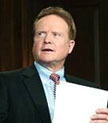 As more than one observer has felt bound to note about Jim Webb’s “barnburner” response to the president’s rhetorically unbowed 2007 State of the Union address: “It’s ironic that it took a former Reagan Republican to lower the boom on Bush.”
As more than one observer has felt bound to note about Jim Webb’s “barnburner” response to the president’s rhetorically unbowed 2007 State of the Union address: “It’s ironic that it took a former Reagan Republican to lower the boom on Bush.”
Yet whatever his background may be, the new Democratic Senator from Virginia has spoken up effectively for some key current progressive values. Reagan himself started out as Democrat who admired FDR. And the facts that Jim Webb’s father served as “a young Air Force captain, flying cargo planes during the Berlin Airlift,” that he himself “was proud to follow … serving as a Marine in Vietnam,” and that his “son has joined the tradition, now serving as an infantry Marine in Iraq,” only underlines the force of his argument.
It is similarly said in political science classes that moments of high political stress inspire the most compelling oratory. And it is a hopeful sign in the USA today that politicians like Jim Webb are starting to rise to the occasion. (What has been most distressing about America lately, Barack Obama has written somewhere, is that its problems are so big and its politics so small.)
 Mr. Webb’s admirably brief and succinct remarks on January 23, in any case, add up to a minor masterpiece of free political communication and common sense. The best commentary on what he said is just direct quotation. And here’s our version of some highlights, as cases in point:
Mr. Webb’s admirably brief and succinct remarks on January 23, in any case, add up to a minor masterpiece of free political communication and common sense. The best commentary on what he said is just direct quotation. And here’s our version of some highlights, as cases in point:
“There are two areas where our respective parties have largely stood in contradiction … The first relates to how we see the health of our economy … The second regards our foreign policy …
“When one looks at the health of our economy, it’s almost as if we are living in two different countries. Some say that things have never been better. The stock market is at an all-time high, and so are corporate profits. But these benefits are not being fairly shared. When I graduated from college, the average corporate CEO made 20 times what the average worker did; today, it’s nearly 400 times …Wages and salaries for our workers are at all-time lows as a percentage of national wealth, even though the productivity of American workers is the highest in the world …
 “In short, the middle class of this country, our historic backbone and our best hope for a strong … future, is losing its place at the table. Our workers know this … Our white-collar professionals are beginning to understand it … And they expect, rightly, that in this age of globalization, their government has a duty to insist that their concerns be dealt with fairly … In the early days of our republic, President Andrew Jackson established an important principle of American-style democracy that we should measure the health of our society not at its apex, but at its base …
“In short, the middle class of this country, our historic backbone and our best hope for a strong … future, is losing its place at the table. Our workers know this … Our white-collar professionals are beginning to understand it … And they expect, rightly, that in this age of globalization, their government has a duty to insist that their concerns be dealt with fairly … In the early days of our republic, President Andrew Jackson established an important principle of American-style democracy that we should measure the health of our society not at its apex, but at its base …
“With respect to foreign policy, this country has patiently endured a mismanaged war for nearly four years. Many, including myself, warned even before the war began that it was unnecessary … and that invading and occupying Iraq would leave us strategically vulnerable in the most violent and turbulent corner of the world …
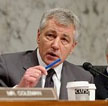 “Like so many other Americans, today and throughout our history, we serve and have served, not for political reasons, but because we love our country … we trusted the judgment of our national leaders. We hoped that they would be right, that they would measure with accuracy the value of our lives … We owed them our loyalty, as Americans, and we gave it. But they owed us sound judgment, clear thinking, concern for our welfare, a guarantee that the threat to our country was equal to the price we might be called upon to pay in defending it …
“Like so many other Americans, today and throughout our history, we serve and have served, not for political reasons, but because we love our country … we trusted the judgment of our national leaders. We hoped that they would be right, that they would measure with accuracy the value of our lives … We owed them our loyalty, as Americans, and we gave it. But they owed us sound judgment, clear thinking, concern for our welfare, a guarantee that the threat to our country was equal to the price we might be called upon to pay in defending it …
“The President took us into this war recklessly…We are now, as a nation, held hostage to the predictable and predicted disarray that has followed … The war’s costs to our nation have been staggering. Financially. The damage to our reputation around the world. The lost opportunities to defeat the forces of international terrorism. And especially the precious blood of our citizens who have stepped forward to serve …
 “The majority of the nation no longer supports the way this war is being fought; nor does the majority of our military. We need a new direction. Not one step back from the war against international terrorism. Not a precipitous withdrawal that ignores the possibility of further chaos. But an immediate shift toward strong regionally-based diplomacy … and a formula that will in short order allow our combat forces to leave Iraq.”
“The majority of the nation no longer supports the way this war is being fought; nor does the majority of our military. We need a new direction. Not one step back from the war against international terrorism. Not a precipitous withdrawal that ignores the possibility of further chaos. But an immediate shift toward strong regionally-based diplomacy … and a formula that will in short order allow our combat forces to leave Iraq.”
The “politically wounded but rhetorically unbowed” forces of right-wing extremism in the USA today are still arguing that to criticize President Bush’s plans for the Iraq War in this way is only to show the rest of the world – and especially all the enemies of freedom and democracy – that America is divided, and has “no stomach” (as Dick Cheney of the jungle has put it) for winning the big war in the world today that counts. But to many of us who are as close to the USA as you can be, 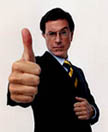 without actually being Americans ourselves, it is the debate Jim Webb has hopefully now helped launch that is really going to show what democracy in America still stands for – and just how steadfast it can be in standing for what it knows is right.
without actually being Americans ourselves, it is the debate Jim Webb has hopefully now helped launch that is really going to show what democracy in America still stands for – and just how steadfast it can be in standing for what it knows is right.
What is happening in the USA now is much closer to America’s finest hour than anything else that has happened in the past four years. And keep your fingers crossed: it could be what is finally going to win in Iraq too (and the rest of the Middle East), for the high cause of the “free and democratic society” everywhere. What other great power in the world today finally does know how to democratically learn from its mistakes so well – and is thus most deserving of the trust of the rest of us?
Can the Dion dream team really work?
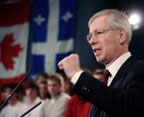 To go from such vast thoughts and concerns of current world history to the much smaller and more modest universe of the political left in Canada today is a bit like leaving the grandeur of Disneyland in Anaheim for a more laid-back afternoon on Venice Beach.
To go from such vast thoughts and concerns of current world history to the much smaller and more modest universe of the political left in Canada today is a bit like leaving the grandeur of Disneyland in Anaheim for a more laid-back afternoon on Venice Beach.
But again there are those who will say that calling the Liberal Party of Canada “left” is … well, not much more than a marketing tool in certain relatively well populated parts of the vast northern North American geography. At best, the Canadian federal Liberals “campaign from the left, but govern from the right.” At worst, even in the new age of the Alberta neo-con Stephen Harper, the war between the Liberals and the Conservatives is just a political variation on the war between Visa and Master Card (er … Visa Canada and Master Card Canada, of course).
And yet it was a Liberal government that kept Canada out of the Iraq War some four years ago now – taking hints from those south of the border like Jim Webb, who “warned even before the war began that it was unnecessary … and that invading and occupying Iraq would leave us strategically vulnerable in the most violent and turbulent corner of the world.” (Just as it was a Liberal government that first put us into Afghanistan, where we nowadays have more than 2,000 brave Canadian soldiers, struggling against the so-called resurgent Taliban in the south – for reasons that many Canadians still don’t feel they altogether understand either.)
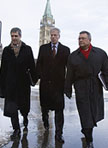 It was a Liberal federal government that gave Canada its current public health care system as well, in the late 1960s. (Granting that the concept was pioneered by Tommy Douglas and his CCF/NDP provincial government in Saskatchewan.) And Canadian Liberal governments of the past few decades probably have something to do with the comparatively stronger position of the labour movement in Canada than in the USA today.
It was a Liberal federal government that gave Canada its current public health care system as well, in the late 1960s. (Granting that the concept was pioneered by Tommy Douglas and his CCF/NDP provincial government in Saskatchewan.) And Canadian Liberal governments of the past few decades probably have something to do with the comparatively stronger position of the labour movement in Canada than in the USA today.
The New Democrats may have almost supplanted the Liberals in parts of Western Canada, and they have lately shown surprising strength in Nova Scotia. But especially in such places as greater Montreal, Toronto, and Vancouver, the Liberal Party of Canada remains as close to a mainstream party of the left as Canadian politics gets. (And nothing in the recent experience of Jack Layton’s federal New Democrats suggests that this going to change anytime soon.)
So it is encouraging to hear about at least a few of the things that Stephane Dion’s alleged new Liberal dream team is apparently up to these days – as everyone wonders just what is really going to happen in Canadian federal politics between now and the summer of 2007.
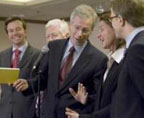 Like everyone else potentially involved, e.g., the dream team does not want a Canadian federal election in 2007, but it is not alone in a very fractious minority Parliament and who knows just how crazy the other guys are? The good news is that, as recently explained by Campbell Clark and Jane Taber in Canada’s self-confessed national newspaper: “Liberal platform co-chair Bob Rae told MPs yesterday that the party’s election-campaign book will not be a shopping list, but focused on a few themes – as the Grits borrow from Stephen Harper’s campaign tactics.”
Like everyone else potentially involved, e.g., the dream team does not want a Canadian federal election in 2007, but it is not alone in a very fractious minority Parliament and who knows just how crazy the other guys are? The good news is that, as recently explained by Campbell Clark and Jane Taber in Canada’s self-confessed national newspaper: “Liberal platform co-chair Bob Rae told MPs yesterday that the party’s election-campaign book will not be a shopping list, but focused on a few themes – as the Grits borrow from Stephen Harper’s campaign tactics.”
And read on. It gets better still: “Mr. Rae, the former Ontario premier tasked with writing the party platform along with MP Scott Brison, told the caucus yesterday that the election platform will be focused,’ according to MPs … One MP said that Mr. Rae’s comments suggested that he and Liberal Leader Stphane Dion will build an election platform that will emulate that of former Ontario Tory premier Mike Harris, who came up with a so-called Common Sense Revolution.”
 Of course, Bob Rae’s position on the new Canadian federal Liberal dream team reflects many of the ambiguities of the left in Canada today, as well as many of its unique opportunities. Mr. Rae is, on the one hand, the former first New Democratic (not Liberal) premier of Ontario. He has now become what some New Democrats say he always was, but he retains some of the patina and connections of what passes for the organized partisan far left in Canadian politics. (And remember of course “New Democrat” in Canadian politics today means more or less the opposite of what it means in the politics of the USA.)
Of course, Bob Rae’s position on the new Canadian federal Liberal dream team reflects many of the ambiguities of the left in Canada today, as well as many of its unique opportunities. Mr. Rae is, on the one hand, the former first New Democratic (not Liberal) premier of Ontario. He has now become what some New Democrats say he always was, but he retains some of the patina and connections of what passes for the organized partisan far left in Canadian politics. (And remember of course “New Democrat” in Canadian politics today means more or less the opposite of what it means in the politics of the USA.)
On the other hand, it seems only a little glib to say that Mr. Rae was also recently the Toronto financial district’s ultimate choice for new leader of the Liberal Party of Canada. That in itself was a great political achievement (even allowing that he has always worn the right clothes for the part). But it was not quite enough for the assembled grass-roots Liberal delegates in Montreal early this past December, who finally chose Stephane Dion. (Who in any case could almost pass for a suitably Gallic French Canadian Quebecois version of Bob Rae – with, again suitably enough in the translation, a bit higher formal education, etc).
In the end M. Dion (following a grand old British tradition, now much faded even in its old- country homeland) has intriguingly decided to at least rhetorically view his leadership as a mere “first among equals,” on the team of many talents and backgrounds that, in theory at least, will eventually blossom as the next popularly elected governing cabinet of the Canadian federation. And it is a bit more intriguing to hear that Bob Rae still appears to be a key team player.
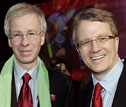 (And intriguing to hear as well that the man who finally did more than anyone else to make Stephane Dion the new Liberal leader last month in Montreal – and who was finally supported by the likes of the youthful Justin Trudeau – is still in the loop too. As Mr. Clark and Ms. Taber have also told us, M. Dion’s “team made it clear” that its current “election planning is a defensive measure, in case Mr. Harper tries to engineer his own defeat by presenting a budget that other parties cannot support.” The “Liberal Party will be ready … if necessary,’ said Gerard Kennedy, who is now Mr. Dion’s special adviser on election readiness. But as the leader has already said, it’s not the choice of the Liberal Party right now to have an election immediately.'”)
(And intriguing to hear as well that the man who finally did more than anyone else to make Stephane Dion the new Liberal leader last month in Montreal – and who was finally supported by the likes of the youthful Justin Trudeau – is still in the loop too. As Mr. Clark and Ms. Taber have also told us, M. Dion’s “team made it clear” that its current “election planning is a defensive measure, in case Mr. Harper tries to engineer his own defeat by presenting a budget that other parties cannot support.” The “Liberal Party will be ready … if necessary,’ said Gerard Kennedy, who is now Mr. Dion’s special adviser on election readiness. But as the leader has already said, it’s not the choice of the Liberal Party right now to have an election immediately.'”)
The question is of course can the team concept really work in the real world of Canadian politics today – which isn’t really all that much more civilized than politics in Washington, DC? (And may in some ways be even worse?) We will have to wait and see.
But there does appear to be an appetite for some more diverse and collective democratic political leadership out there among we the diverse and eclectic Canadian people these days. It does contrast nicely with the more right-wing autocratic style of Stephen Harper. And M. Dion himself seems to be making some personal progress as the first among the equals on the team. As recently explained by the Canadian Press, at any rate, on a Montreal anglophone radio station website: “Dion’s dry humour, from-the-heart style, impress Western Liberals.”
 What is the resulting new Canadian mainstream left main policy thrust going to look like, substantively and down on the ground where it really counts? Going back to Mr. Clark’s and Ms. Taber’s report: “To come up with ideas and encourage caucus participation, Mr. Rae had MPs and senators break up into small groups of about five that were asked to develop themes, in bite-size phrases, for the platform … One MP said that marrying the economy with environmental action was a dominant theme – some form of It’s the environmental economy, stupid.’ Some came up with slogans such as, The environment is wealth’ or The environment is health.'”
What is the resulting new Canadian mainstream left main policy thrust going to look like, substantively and down on the ground where it really counts? Going back to Mr. Clark’s and Ms. Taber’s report: “To come up with ideas and encourage caucus participation, Mr. Rae had MPs and senators break up into small groups of about five that were asked to develop themes, in bite-size phrases, for the platform … One MP said that marrying the economy with environmental action was a dominant theme – some form of It’s the environmental economy, stupid.’ Some came up with slogans such as, The environment is wealth’ or The environment is health.'”
Set beside the bold current of economic populism in Jim Webb’s barnburner response to the 2007 State of the Union address down south, “It’s the environmental economy, stupid” no doubt still does seem a little lame and a bit behind the times. Conceptually at least, Stephane Dion’s leadership campaign “three pillars” of economic prosperity, social justice, and environmental sustainability has more bite. It just needs to be put into more colloquial language somehow. (How about, e.g., “Conrad Black is the end of an era in Canadian business.” Well, that won’t do either of course – but it does seem to touch on one of Mr. Webb’s compelling themes.)
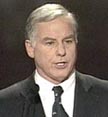 In any case, who knows? It just may be that the Liberal Party of Canada is starting to make some kind of fresh start, just as the wider currents of progress in North America are starting to stir in some big enough new ways too. And remember: It was Howard Dean who gave the keynote address at the recent Canadian Liberal convention in Montreal that elected Stephane Dion and the new dream team. And remember too, maybe, what is often said, with a little accuracy once in a while: “When the US markets catch a cold, Canada comes down with pneumonia.”
In any case, who knows? It just may be that the Liberal Party of Canada is starting to make some kind of fresh start, just as the wider currents of progress in North America are starting to stir in some big enough new ways too. And remember: It was Howard Dean who gave the keynote address at the recent Canadian Liberal convention in Montreal that elected Stephane Dion and the new dream team. And remember too, maybe, what is often said, with a little accuracy once in a while: “When the US markets catch a cold, Canada comes down with pneumonia.”

